This Digital Nomad Couple Sold Everything to Travel the World in a Sailboat—Here’s What They’ve Learned About Life, Goal Setting and Relationships
Her name is Polar Seal. She’s 40 feet long, bright white with a thin blue stripe down each side and a monochromatic logo of a seal at the helm.
To the sailing community, she’s a 2007 Beneteau Oceanis 40 with a two-cabin layout. To Ryan Ellison and Sophie Darsy (@ryan_and_sophie_sailing), she’s a vehicle to carry them across the Atlantic (for the third time); she’s an office for their respective careers; but most importantly, she’s been home for nearly four years. They are what’s known as “liveaboards,” a breed of digital nomad on the water, with Sophie managing their digital brand, Ryan & Sophie Sailing, while Ryan works as a business development consultant.
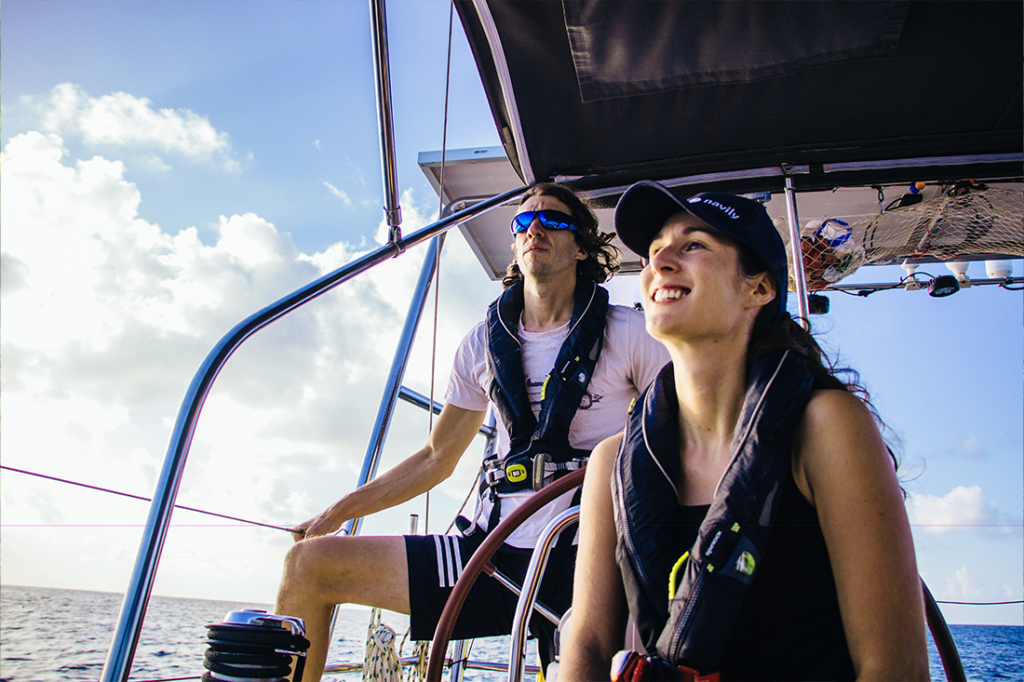
Before officially shoving off in 2018, Ellison and Darsy led what some might call typical lives. They met on Tinder in 2015 while living in Sweden as expats: Ellison, an aviation sales director from Des Moines, Iowa, and Darsy, a human resources systems specialist from Paris. They quickly connected over a shared love of adventure and endurance sports.
Three months later, while on his last long training run before the ASICS Stockholm Marathon, Ellison had a run-in with a Canadian goose trying to protect her ducklings. The geese were unharmed, but Ellison was left with a dislocated shoulder and several broken bones. Stuck inside, he did what most do in that situation: get lost in the depths of the internet. He stumbled on a story about Matt and Jessica Johnson, an American couple who sold everything to buy a sailboat and travel the world with their cat.
The story lit a spark for the couple, though they had no experience sailing. After several months of research, they attended a two-week sailing course in Gibraltar before selling Darsy’s apartment and buying Polar Seal in March 2016.
“On my second date with Sophie, I told her I wanted to own a yacht someday,” Ellison says. “But my view of a yacht was a rich person’s motorboat, and I did not ever imagine I would own a small sailboat that we would live on together and go around the world.”
Now, nearly four years, 14 countries and a global pandemic later, they have no plans to quit.
Ellison and Darsy learned that the most challenging (and rewarding) parts of being liveaboards in a relationship had little to do with the logistics of sailing and a lot more to do with life, interpersonal dynamics and developing self-awareness in roughly 350 square feet of space. These are five of those lessons.
Your speed is the right speed
Ellison and Darsy purchased Polar Seal in March 2016, but they didn’t hit the waters full time until June 2018. They spent two admittedly short Swedish sailing seasons preparing for the inevitable roadblocks and learning how to co-captain on their own.
“There is no instructor, and the sail needs to go up and it’s stuck, and you’re in the middle of a channel, and the helm gets stuck, so you’re stuck in a spinning motion in the middle of a channel,” Darsy says. “There’s always going to be moments when you don’t have the knowledge or experience you need to handle a situation, and you have to figure it out. There are no shortcuts for that.”
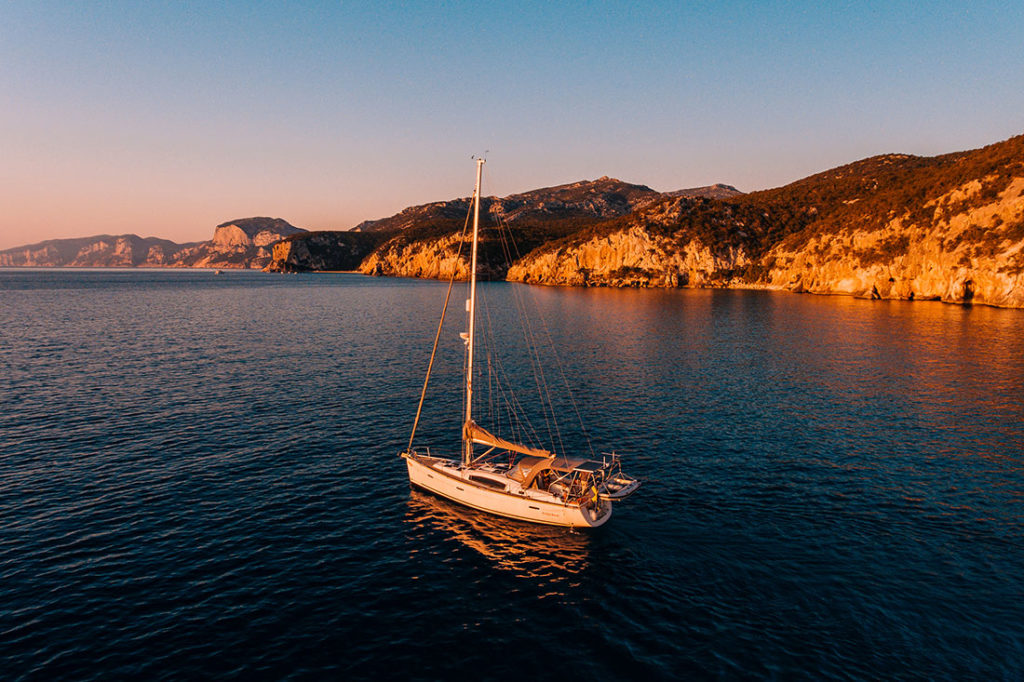
Methodically, they took each step with time to allow dust to settle and not get caught up in the excitement and newness of the adventure.
“The first two years we owned our boat, we kept it in Stockholm,” Ellison says. “We were still working our jobs and that gave us time to figure out our boat and figure out what we were doing… because we really didn’t know. I’m glad we did that.”
Your relationship will be tested.
Among the many challenges of life aboard a 40-foot sailing boat is the idea that you are never more than a few steps from your significant other. That person is not only your co-captain, but your confidante, your significant other, your only friend for thousands of miles at times. They prepared for that, too.
“Pretty quickly in our relationship, we started seeing [a couple’s counselor],” Darsy says. “There are those moments that you want external help. There should not be any taboo or stigma about going to see a couple’s counselor when you feel stuck on a particular topic.”
The challenge, Ryan says, is not always about the small space, but about sleep deprivation and the other stressors that can wreak havoc on your ability to stay calm. In those moments of frustration, there isn’t anywhere to escape.
“We call it having emotional flexibility,” Darsy says. “Be kind to yourself, and be like OK, I messed up, but also don’t define your relationship by those moments. Those moments happen out of a context that is a little bit bigger than you.”
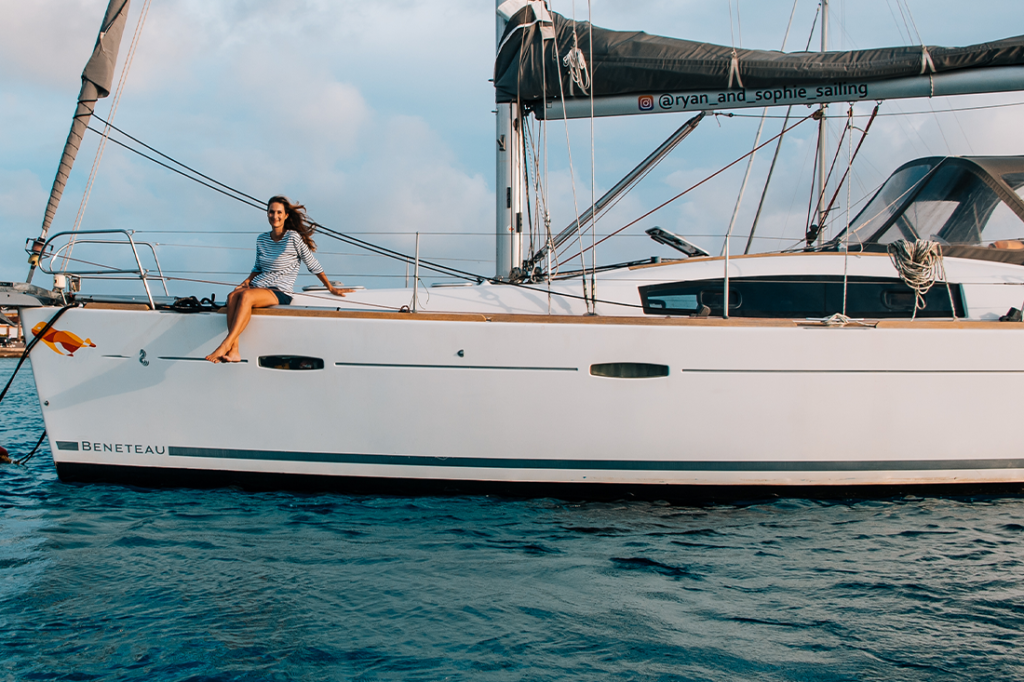
You will never be fully prepared.
In a video posted on May 22, 2018, Darsy holds up two fistfuls of sticky notes, 15 wooden cooking spoons and a smashed pirate hat. It’s a relatable moment for anyone who’s packed for a multi-week international trip only to remember they probably don’t need five pairs of strappy sandals. But it’s the vulnerability of the video that strikes a chord. With four weeks until their launch date, the couple details the building emotional strain and fear.
“For the first time in my life, I don’t know where I’ll be in one year’s time,” Darsy says in the video. “I’m doing something I’m passionate about, but I don’t know where it’s going to lead me.”
The couple shared a fear of failure. “I’m afraid we’re going to crash the boat,” Ellison says in the video. “I’m afraid that I’m not going to be able to get stuff done for work. I’m afraid we’ll fight and yell and I’ll fail there.”
It’s this kind of behind-the-scenes footage that allows aspiring liveaboards to see what life is really like, but also feel the sense of connection that comes from seeing people go through similar struggles and feelings of self-doubt. Preparedness is important, but its powers are limited.
Whether launching a new business, leaving a toxic job for your mental health or, say, selling everything to live on a boat, the final moments are those most riddled with self-doubt. But the story is told time and time again: After the first step, you often learn that fear outsizes reality.
Ellison and Darsy spent two years imagining and preparing for every worst-case scenario they could imagine. She remembers sitting at her office desk running through scenarios and playing out the possible responses. And there have been scares, like the time they sailed through gale force winds in the Bay of Biscay or a difficult period sailing across the Bermuda Triangle. To Darsy, the video footage from that time serves as a reminder of her growth.
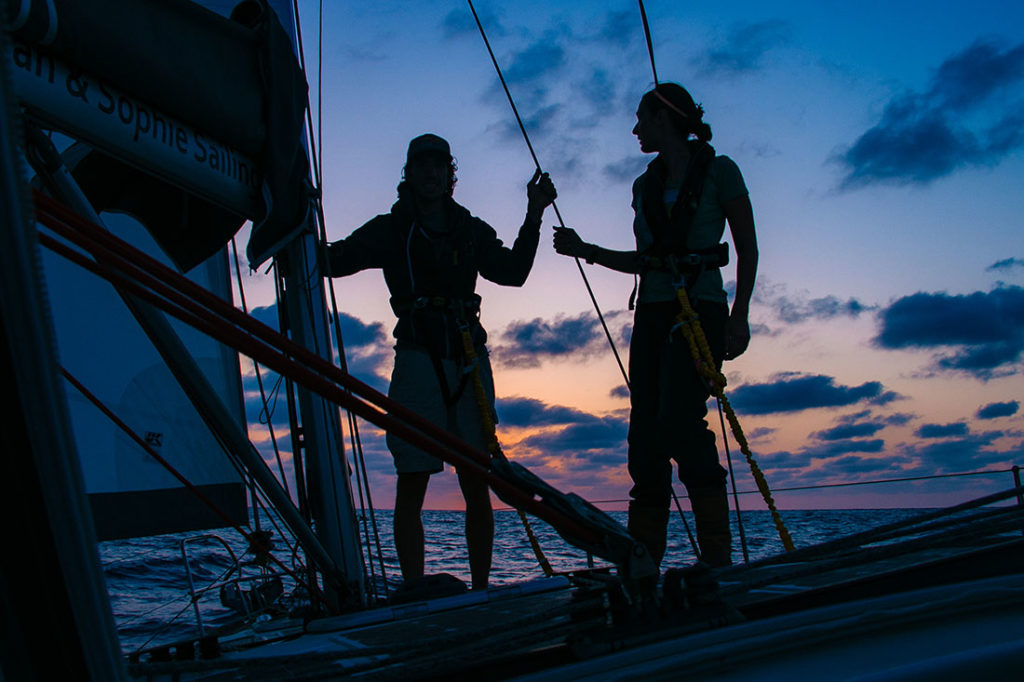
“As you start to understand that the boat can take more than you think, you start to be a lot more confident in both the boat and your ability to deal with whatever it is you encounter,” she says. “That’s the thing, you start gradually getting out of your comfort zone, and going into stronger and stronger seas, and at the end of the day you’re like, It’s not comfortable, but it works.”
Her biggest regret, she says, is not leaving sooner.
Flexibility is everything.
When your life is full of firsts, even the most basic tasks can feel overwhelming. These things, like the cultural norms of grocery store shopping, for example, or navigating the public transportation system can be learned fairly quickly. But when you’re stressed and sleep-deprived, these obstacles can feel insurmountable.
“Every time we go somewhere, it’s somewhere we’ve never been, where we have to learn procedures, where we have to learn grocery shopping, where we have to learn the area,” Darsy says. “Something is going to break on the boat and it will be the first time that thing breaks on the boat, and we have to deal with that. ‘First times’ is our life.”
For many digital nomads, this kind of relentless discomfort quickly leads to burnout and a craving for the familiarity of home. For Ellison and Darsy, the key is extreme flexibility. Sometimes that looks like compromising on how long to stay in one place. Other times, it looks like booking a flight home to spend time apart so both can come back refreshed. In all times, it looks like relieving pressure where you have the means to do so.
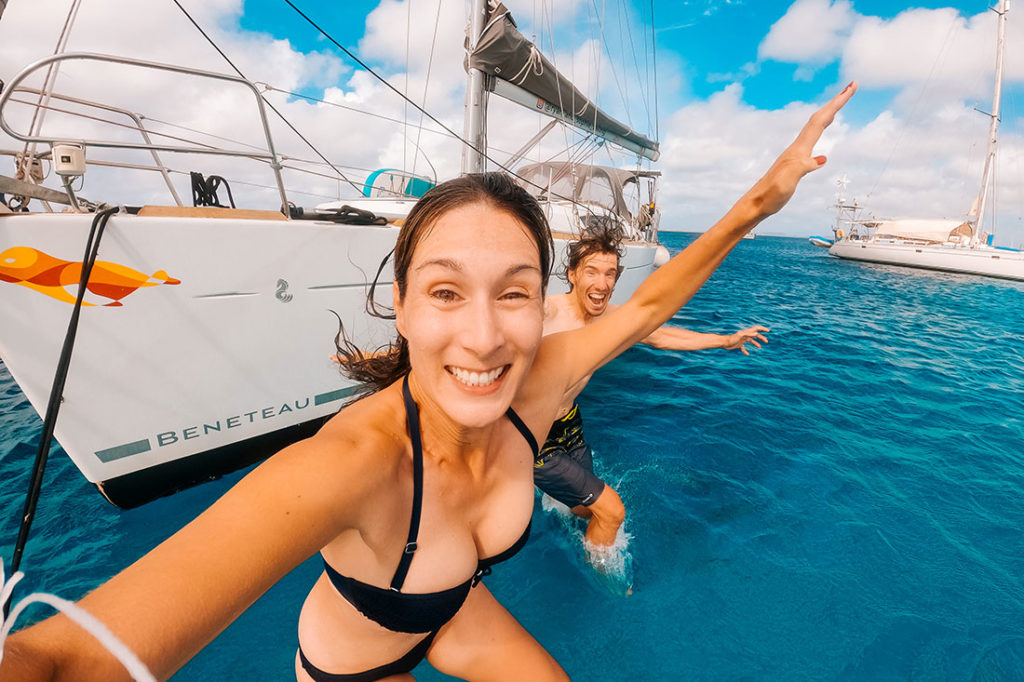
“In a normal relationship, you go to work, and you maybe see each other for a little bit in the morning or a couple of hours at night,” Ellison says. “Sophie and I see each other 24/7 and pretty much live on top of each other, so having the ability to take some of the personal space to make your own stories so you can come back refreshed and have new adventures to talk about with your partner is important.”
Community remains crucial.
According to a report funded by MBO Partners, nearly 11 million people identified themselves as digital nomads in 2020. Tracking on this kind of lifestyle is still in the nascent stages, so it’s hard to say how many of those digital nomads live on the water, but for Ellison and Darsy, the sailing community has become the most rewarding part of their lifestyle. For Darsy, having the opportunity to pay it forward to aspiring liveaboards is part of her value system.
“We take the time to answer emails or meet people who want to do what we’re doing, to give information, help, advise or support in some way,” she says. “I think if we all do this, it just becomes a little bit of a better world.”
* * *
With every decision comes the forfeiture of another opportunity. For digital nomads, entrepreneurs, and all those who trade routine and comfort for adventure and flexibility and the excitement of the unknown, the decision is neither easy nor one you make once. Ellison and Darsy thrived in active lifestyles on land, clocking dozens of miles running each week. Now they’re lucky to see that number within a year.
“It is a lifestyle that comes with a high price, and I’m not really talking in terms of the money, because at the end of the day it’s just like living in a house or in an apartment; you’re going to have expenses,” Darsy says. “But it is tiring, exhausting and uncertain. The boat is a fragile piece of equipment, you can lose it from one day to the other if weather comes or you have a fire. But we have seen more of the world than most people will ever see in their lifetime, and we get to explore that world from a new angle.”
In the cabin of Polar Seal are written the couple’s values: adventure, health, faith and cool people. This guidepost for difficult days is simple and specific. In a more traditional lifestyle, the idea of five- and 10-year goals are common. It might be to upgrade the house, have a baby, reach a certain level in your career. Ellison and Darsy have goals, but they’re fluid and don’t really fall into a set time frame. Darsy wants to sail to Japan and maybe upgrade the boat. A permanent place on land for breaks sounds nice, too. They’ll just have to see where the wind takes them.
“I’ve used this line and it may sound cheesy, but we set out to explore the world and I ended up discovering myself as a person,” Ellison says. “Over the past 18 months, that has been more of a journey for me than moving the boat from point A to point B.”
This article originally appeared in the January/February 2022 Issue of SUCCESS magazine. Photos courtesy of Ryan Ellison and Sophie Darsy
The post This Digital Nomad Couple Sold Everything to Travel the World in a Sailboat—Here’s What They’ve Learned About Life, Goal Setting and Relationships appeared first on SUCCESS.
from SUCCESS https://ift.tt/3ew1izl
Comments
Post a Comment